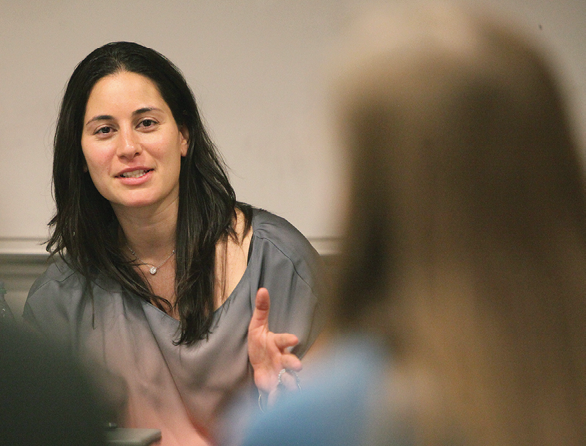
When President Lyndon Johnson established the White House Fellows program in 1964, he had people like Samar Ali ’06 in mind. Johnson wanted to give exceptional young Americans the opportunity to work at the highest levels of the federal government and to use that experience to benefit their home communities. Ali was an ideal candidate to join that illustrious group.
Ali, who earned both her undergraduate and law degrees at Vanderbilt, was a campus leader from the start. She is Muslim and was raised in Waverly, Tennessee, where her immigrant parents are both doctors who run a medical practice. She was a junior majoring in political science when the 9/11 attacks occurred. On September 13, 2001, she stood up in front of thousands of fellow students. “When I saw my country’s buildings come tumbling down with thousands of my fellow citizens on Tuesday, I felt angry as an American at whoever did this,” she told the group. “The other part of me felt upset as a Muslim…. I want everyone to know that Arabs and Muslims around the world condemn this act. We cannot let these terrorists succeed and fill our hearts with hatred. We cannot allow them to split us apart as Americans.” The following spring, Ali was elected president of the student government—the university’s first Arab-Muslim to hold that office.
Ali was an associate with Hogan Lovells US working in the United Arab Emirates, where she helped establish the firm’s office in Abu Dhabi, when she was named a White House Fellow in 2010. Her yearlong fellowship changed her career path. Ali served as an adviser on the senior staff of Homeland Security Secretary Janet Napolitano, learning about the federal government from top-ranking officials in all three branches. After her fellowship ended, she continued her work as an adviser to the Department of Homeland Security in Washington and in Doha, Qatar. “I believe that government should be structured to make people’s lives better and to create the opportunity to maximize potential both individually and collectively,” she said. “Through learning how our government functions at the federal level, I realized during my time as a White House Fellow that if I really wanted to make a positive difference as an American, I needed to focus on the state and grassroots level as well.”
In 2012, when Tennessee Governor Bill Haslam asked Ali to join his administration as an assistant commissioner in the Department of Economic and Community Development, she accepted. Her appointment quickly elicited a backlash from anti-Muslim groups who accused Ali of being an agent for “financial jihadists” because of her expertise in Middle Eastern business practices. Governor Haslam and administration officials stood by Ali, calling her “one of the brightest leaders of her generation from this state.”
As ECD’s assistant commissioner for international affairs, Ali led the state’s efforts to recruit foreign direct investment into Tennessee, as well as Tennessee Trade, the state’s initiative to increase exports abroad by small- and medium-size businesses. When companies consider locating in Tennessee, they evaluate the state’s culture, including religious and racial tolerance, education statistics and legislation. “They want to make sure their employees feel welcome and safe,” she said. “The more we can be respectful of people from other cultures, the more opportunity Tennessee will have for job growth from foreign investment.”
In November 2013, Ali returned to the private sector as a legal consultant and adviser to both the U.S. government in Washington, D.C., and multilateral institutions on topics ranging from national security to transitional justice to economic development in war-torn areas around the world. She remains actively involved in both the Vanderbilt and Nashville communities, serving on the Governor’s International Advisory Council, the Saint Thomas Health Board, the Vanderbilt Law School Board of Advisors and the Vanderbilt Alumni Association Board of Directors. “I’ve always believed that there is a revolving door of sorts between the public and private sectors, and my career to date has been indicative of that,” Ali said. “My time as a White House Fellow certainly instilled in me the belief that public service, whether on the local, state, or federal level, is paramount to social, judicial, economic and legislative progress.”